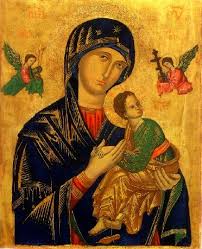The Nicene Creed
 We believe in one God, the Father, the Almighty, maker of heaven and earth, of all that is, seen and unseen.
We believe in one God, the Father, the Almighty, maker of heaven and earth, of all that is, seen and unseen.
We believe in one Lord, Jesus Christ, the only Son of God, eternally begotten of the Father, God from God, Light from Light, true God from true God, begotten, not made, of one Being with the Father. Through Him all things were made. For us and for our salvation He came down from heaven: by the power of the Holy Spirit He became incarnate from the Virgin Mary, and was made man. For our sake He was crucified under Pontius Pilate; He suffered death and was buried. On the third day He rose again in accordance with the Scriptures; He ascended into heaven and is seated at the right hand of the Father. He will come again in glory to judge the living and the dead, and His kingdom will have no end.
We believe in the Holy Spirit, the Lord, the giver of life, who proceeds from the Father.* With the Father and the Son He is worshiped and glorified. He has spoken through the Prophets. We believe in one holy catholic and apostolic Church. We acknowledge one baptism for the forgiveness of sins. We look for the resurrection of the dead, and the life of the world to come. AMEN.
*Roman Catholics and Protestants add ‘and the Son’ at this point.
When Constantine won control of the Roman Empire in 312 A.D., he elevated Christianity to favored status. He soon discovered the fractured state of the church and what it believed. To bring a unity, he convened a council in the year 325 that met in the city of Nicaea. Out of that convention came the Nicene Creed, which is still a standard of belief for many Christian churches.
The reference to "the holy catholic Church" in both the Nicene and
Apostle's Creeds refers to the universal church, not the denomination.
We believe in one Lord, Jesus Christ, the only Son of God, eternally begotten of the Father, God from God, Light from Light, true God from true God, begotten, not made, of one Being with the Father. Through Him all things were made. For us and for our salvation He came down from heaven: by the power of the Holy Spirit He became incarnate from the Virgin Mary, and was made man. For our sake He was crucified under Pontius Pilate; He suffered death and was buried. On the third day He rose again in accordance with the Scriptures; He ascended into heaven and is seated at the right hand of the Father. He will come again in glory to judge the living and the dead, and His kingdom will have no end.
We believe in the Holy Spirit, the Lord, the giver of life, who proceeds from the Father.* With the Father and the Son He is worshiped and glorified. He has spoken through the Prophets. We believe in one holy catholic and apostolic Church. We acknowledge one baptism for the forgiveness of sins. We look for the resurrection of the dead, and the life of the world to come. AMEN.
*Roman Catholics and Protestants add ‘and the Son’ at this point.
In the first three centuries, the church was often
forced into secrecy and seclusion. As a result, it was fraught with
theological disputes and differences, especially concerning the divinity of Christ.
When Constantine won control of the Roman Empire in 312 A.D., he elevated Christianity to favored status. He soon discovered the fractured state of the church and what it believed. To bring a unity, he convened a council in the year 325 that met in the city of Nicaea. Out of that convention came the Nicene Creed, which is still a standard of belief for many Christian churches.







No comments:
Post a Comment